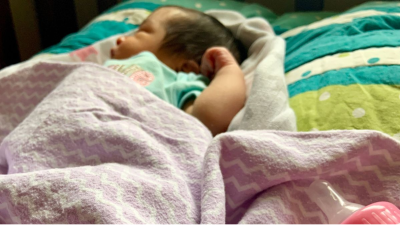This story will make you want to be a foster care family

I (Tara) remember it like it was yesterday: my first experience in a government-run orphanage. After years as a missionary in Honduras working in private orphanages, I was in shock. Walking into the institution I saw over 100 children, many with disabilities, and only a few caregivers. Infants spent their days in cribs and were infrequently changed, bathed, and fed.
While volunteering in that orphanage, I noticed that many babies were regularly sick and in and out of the emergency room due to pneumonia and other serious health conditions. One day, an orphanage worker begged a fellow volunteer to take a very sick baby girl home. Miraculously, within four months of living with her, the baby was completely healthy. All she needed was to be held while she drank her bottle.
You see, the pneumonia these babies suffered from wasn’t caused by a nasty cold. It was caused by damage to their lungs from drinking out of propped-up bottles. There weren’t enough staff members to hold the babies’ bottles for feedings. While I realized the smaller orphanages I had worked in were not ideal for children, it was working in this institution that made something click — all children need to be raised in families.
This was a watershed moment for my husband and me as we realized that the most important work we could do was not continue to love on children in orphanages, but to help children find forever families — families that would not only feed babies but would help them thrive into adulthood.
When many of us hear about orphans we assume they can be properly cared for within an orphanage. I know I did. But our first experience as foster parents many years ago, as well as almost 20 years of work supporting orphaned and vulnerable children since then, has taught us the opposite: children need safe and loving families.
I (Jorge) grew up in Honduras in a middle-class family and went to a private bi-lingual school. My city had quite a few orphanages, but I remained mostly unaware of them. When I did occasionally notice them, it made me uncomfortable to think about the children who tragically had to grow up in these places. This is common: many of us don’t want to think about the painful situations children all around the world find themselves in when they are without a family and a home.
So, our responses tend to either take the form of denial that we aren’t needed because others are doing the work, or rejection because the reality that there are so many orphans in the world is overwhelming.
But what children who are orphaned and vulnerable need are for us to not turn away. Galatians 6:2 tells us to “carry each other’s burdens” and Psalm 34:18 reminds us that God himself is there with the brokenhearted. We must, James 1:27 says, “look after orphans and widows in their distress.”
With God’s grace, my nagging guilt turned into a calling when I joined my wife in ministry to children in orphanages. It soon became evident that God wanted us to join Him in His work to reconcile children to families, and we began a foster care ministry in our community.
People tend to equate foster care with vulnerable children in the U.S., and yet they equate orphanages with vulnerable children in other countries. Often this is because of the myth that families within a child’s community cannot care for them, and orphanages are the only option. Our work in Honduras to engage the local church to strengthen families to care for their children and recruit foster parents has shown us that this line of thinking is at odds with what Scripture calls us to do. It’s time we move on to something more in line with God’s design for children — family.
The importance of family cannot be underestimated. Research has shown that children who grow up in healthy families are more emotionally and cognitively astute, more resilient when hard times come and have lower rates of depression and other mental health struggles. And family isn’t just important in the big milestones of life — where it matters most is in the mundane daily struggles and victories. It matters most when we hold a baby while she has her bottle, when we cry alongside our heartbroken child, and when we dance with them at their wedding. In a world of independence, the greatest gift we can give each other — and the children who are growing up today is interdependence.
To shift our thinking, we must begin by building a strong understanding of family. We’ve learned that family is what helps to form hopeful children who can change our world. God knew this about us too when he called us into his family. Not leaving us at a distance as acquaintances, he called us “sons and daughters” and “brothers” and “fellow heirs.” Of us, he said, “[You are] no longer foreigners and strangers, but fellow citizens with God’s people and also members of his household” (Eph. 2:19).
As National Foster Care Month comes to an end in the U.S., expand your love and compassion to the millions of children living in orphanages today. Join us and others around the world in pursuing God’s intention for every child to know the love and belonging of family.
Tara and Jorge Garcia are co-founders of Identity Mission, which supports vulnerable children in Honduras. To date, they have supported 75 children through family-based care and supported hundreds of biological families to care well for their children.




















